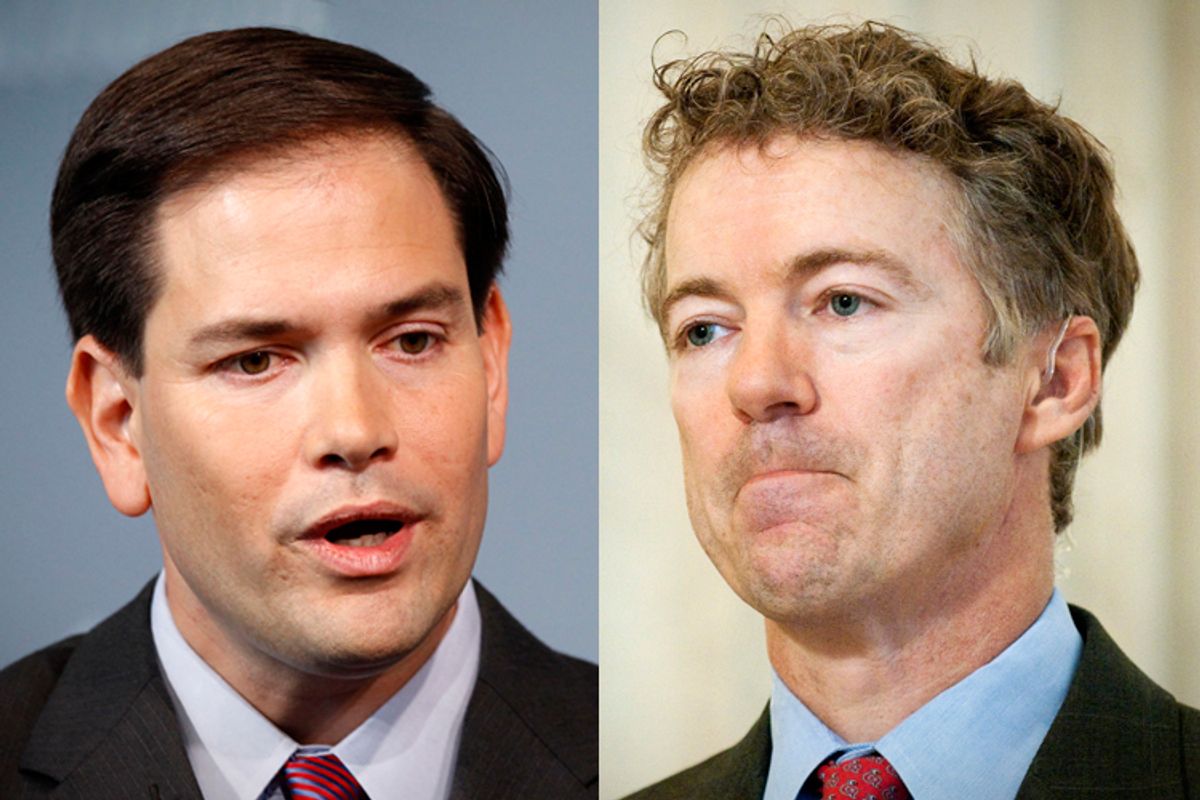Take a look at the speakers roster for the Conservative Political Action Conference, which kicks off in Washington today, and it’s easy to conclude that the annual gathering of conservative activists has devolved into a circus show. Not only are Chris Christie and Bob McDonnell, two of the most popular Republican governors in the country, not invited, but Donald Trump and Sarah Palin are being given two of the longest blocs of time at the podium. It’s almost enough to make it feel like CPAC ’13 was planned by some mischievous Democrat.
The event, as it always does, will attract thousands of conservative activists, opinion-shapers and politicians and will receive substantial media coverage. It’s hard to say exactly how well the conference, which serves as an umbrella for a funky area of right-leaning groups and causes, reflects the conservative movement, but the events of the next few days could provide some useful clues about where conservatism is heading in Barack Obama’s second term and the role that some prominent and ambitious Republicans will play in it.
To that end, here are three things to be watching for at CPAC:
1. The mainstreaming of Rand Paul: The Paul name has been a divisive one at Obama-era CPAC gatherings, with rabid supporters of Ron Paul invading the hall to cheer on their man, jeer his Republican enemies, and in 2010 and 2011 delivering straw poll victories to him. When those straw poll wins were announced, the boos from the rest of the attendees were loud and lusty. Ron Paul’s CPAC appearances perfectly captured the nature and limits of his political appeal. His libertarian message, non-interventionist views and devotion to the gold standard attracted a sizable, committed following, but many of the true-believers weren’t actually part of the Republican Party. Meanwhile, that same message – and the missionary zeal of Paul’s backers – alienated the rest of the party, guaranteeing that he’d always be a lightning rod in the party and placing a permanent ceiling on his growth.
It’s a different story for Rand Paul, though, who inherited the family’s political operation when his father retired from the House after last year’s election. He has ambitions not just to run for president but to seriously compete for the Republican nomination, in a way his father never did. And as he showed with his filibuster last week, he has a knack for drawing attention to himself in a way that upholds his basic libertarian worldview without alienating wide swaths of the Republican Party. As I wrote at the time, the most notable aspect of Rand’s filibuster was how many mainstream Republicans ended up joining him on the floor – a show of support his father never dreamed of.
CPAC could provide further evidence that Rand Paul is making inroads into the conservative mainstream (and that the conservative mainstream is simultaneously moving toward Paul-ism). His will be one of the most closely watched speeches, and if it ends with the Paul-ites united with rank-and-file conservatives in raucous cheers, it will be further proof that the younger Paul is a far more serious force within the GOP than his father ever was – and that his national prospects are real.
2. The immigration question: If there’s one issue where there’s been real movement on the right since the election, it’s immigration. And the point-man has been Marco Rubio, the Florida senator and potential 2016 White House candidates. Rubio is at work on legislation that would create some sort of path to citizenship for the undocumented, and has been making the rounds selling the idea to previously hostile leaders on the right. He’s had some success so far, winning praise from Rush Limbaugh and even forcing Jeb Bush to abandon his watered-down plan for a path to legal status and to reembrace the citizenship concept. Still, immigration remains a highly sensitive issue on the right, where strong nativist sentiments are still prevalent. Rubio will be speaking at CPAC, and it will be interesting to see whether he includes his immigration reform ideas in his message – and, if he does, how the crowd reacts. And if he doesn’t mention immigration and instead sticks with the standard right-wing red meat, that will also be telling, suggesting that Rubio has concluded he has a lot more work to do behind the scenes before it’s safe to play up a path to citizenship plan in front of a conservative audience.
3. The uninviteds: The snubs of Christie and McDonnell have attracted considerable attention. The New Jersey governor is supposedly unwanted by organizers because of his vocal praise for President Obama at the height of Sandy last fall – which came just days before the election. McDonnell apparently wasn’t included because of the transportation bill he recently signed, which includes some tax increases. Some have interpreted these snubs as evidence that both men have fallen from favor with conservative leaders and are slipping behind in the all-important pre-2016 “invisible primary.” But there’s reason to believe that it wasn’t a groundswell of opposition that accounted for each man’s non-invite, but rather a decision from a relatively small group of conference organizers. I’ve suggested that Christie (and probably McDonnell too) is still in very good standing with the right and would receive a warm welcome from the crowd if he showed up at CPAC.
Let’s see if any prominent speakers decide to mention the two snubbed governors – and let’s see how the crowd reacts if they do.



Shares